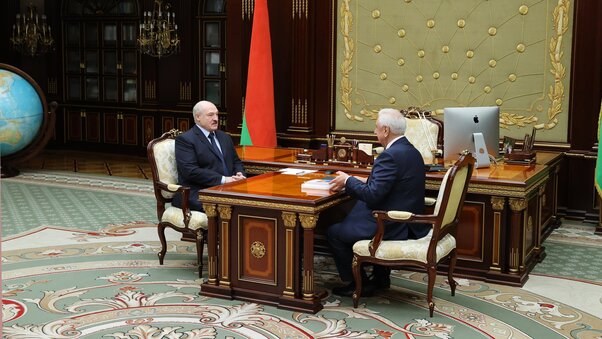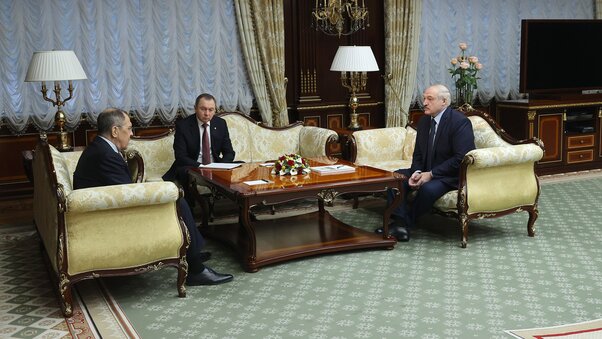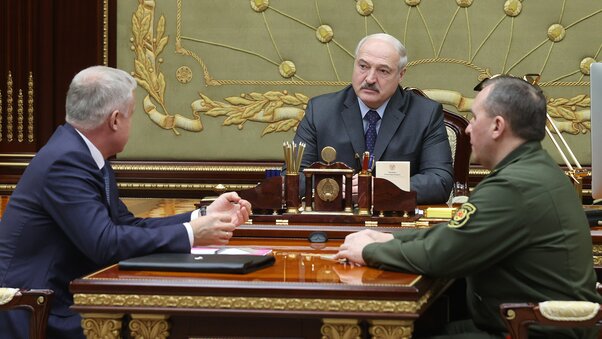CSTO Collective Security Council session
- 13
- 2
Belarus President Aleksandr Lukashenko took part in a video conference of the Collective Security Council of the Collective Security Treaty Organization (CSTO) on 2 December.
The leaders of the CSTO countries reviewed the situation in the CSTO region and in the world as a whole, the status of implementation of the agreements, new challenges and threats, the inter-parliamentary cooperation and the priorities of the CSTO.
In his speech Aleksandr Lukashenko expressed concern over the buildup of military presence of the USA and NATO near western borders of the CSTO.
“Once again the world is on the brink of an unbridled arms race. The most dangerous phenomena are getting worse, namely a military standoff between global centers of power. The buildup of military presence of the USA and NATO near western borders of the Collective Security Treaty Organization is a cause for serious concern,” Aleksandr Lukashenko said.
The President explained he had primarily referred to the deployment of additional U.S. troops in Poland and the country’s plans to set up new military infrastructure facilities. “We clearly see an increase in systemic events of military nature in Poland and in Baltic states,” Aleksandr Lukashenko added.
“Meanwhile, not only Belarus’ national interests are targeted by military activity. In this context one should also consider NATO’s statements about the development of some new strategic concept. I believe it is already clear for everyone who and what it will target,” the head of state noted.
The President also drew attention to the unprecedented buildup of all kinds of sanctions. “These international law measures, which are supposed to be used only in exceptional cases and only for the sake of resolving the most important issues of peace and security, have become an everyday occurrence,” the Belarusian leader noted.
The head of state noted that the COVID-19 pandemic did not only complicate international communication, but also provoked an exacerbation of social conflicts. Unprecedented riots are taking place around the world. The President cited the riots in the United States and European countries as a case in point. According to him, these countries were until recently considered very prosperous states and almost exemplary ‘democracies’.
“It is already clear that this is not a spontaneous manifestation of discontent, as mass media are trying to make it look. The world order is sliding towards the so-called controlled chaos. There is a well-planned and orchestrated activity of global players who sometimes disregard anything, even the interests of their own people,” Aleksandr Lukashenko stressed.
“It is obvious that a universal balance between civil liberties and national security interests has not been achieved in the Western society. Apparently, this is the reason for the increasingly unceremonious imposition of double standards on the international public opinion. On the one hand, the extremely harsh response of the Western authorities to the protests and the generally unpopular state policy are presented by them as an objective necessity. On the other hand, the efforts of other countries to ensure stable development, maintain law and order and legality are presented as dictatorship and despotism. Although these measures have a smaller scale than their own ones,” the Belarusian leader said.
“Under these unequal systems of reference, the manipulation of people, the use of hybrid solutions and technologies of the so-called color revolutions have become commonplace. In fact, there are no color revolutions here, these are ordinary riots,” Aleksandr Lukashenko added. “A revolution happens when there is a reason for a revolution (we have studied it), when the masses don’t want anything, when the leaders can’t do anything and so on, and when there are revolutionaries. Neither you nor us have revolutionaries today. All the so-called revolutionaries want to live well and, preferably, at somebody else’s expense. When you start using their language to talk to them, the so-called revolutionaries quickly turn into exiled politicians. Therefore, they have never had any good intentions.”
According to Aleksandr Lukashenko, outside interference has been a reason for the escalation of the situation in Belarus. “The case is that, I am quoting here, ‘the Belarusian lands historically belonged to Poland’. This is being said in an open regime. Can I, as President, and the Belarusian people agree with that? They say that the place where we are living in does not belong to us. It is clear to whom they belong. And they are acting accordingly,” the head of state said.
Aleksandr Lukashenko said that the NATO is setting up a military group for the penetration of western Belarusian lands. “Tell me, how we should respond to that,” he said.
Apart from that, the President recalled old plans of western countries to create a sanitary belt between the EU and Russia. “These are the goals that they failed to achieve after the collapse of the Soviet Union, in the mid-1990s. The President of Russia and I understand it very well. The events in Belarus (they are openly saying that) are a trampoline for putting pressure on the Russian Federation,” the head of state stressed. “I want to say in a friendly way: if someone thinks that Belarus is far away…Some time ago we were not thinking about it either. Even the events in Ukraine – we were thinking that it was going on somewhere else. Before you know it, something like that will happen in your countries.”
Aleksandr Lukashenko is convinced that the CSTO countries should join efforts against external threats using the Belarusian experience among other things. “Everybody have said that, now we need to be together more than ever,” he said.
According to the President, economic cooperation is the foundation of unity. “If we work together in the economy, and it was our goal in the Eurasian Economic Union, we will survive. If we don’t, they will swallow us,” Aleksandr Lukashenko added.
The head of state emphasized that this year Belarus has been experiencing open interference in its domestic affairs, including through attempts to provoke public discontent.
“We are urged to change the government, laws and social priorities. Otherwise, they threaten to crush us with sanctions, destroy the economy and infrastructure, alter moral and ethical pillars of our society. Now there is no doubt that civil peace and integrity have been and still are on the line in Belarus. They want us to change the government, laws and social security objectives in a very cynical way. These suggestions no longer come in disguise of diplomatic wording,” the President noted.
“Frenzied behavior of Poland and the Baltic countries against Belarus deserves a special mention. We clearly see that their actions pursue their own interests and are aimed at increasing their weight in the European Union. I want ordinary people in these neighboring countries to hear about the unworthy and shameless behavior of their politicians,” Aleksandr Lukashenko said.
Many people have already understood by now, that the world will not be the same as a year or two ago, neither will it be as we have imagined, the head of state pointed out. “However, we still will have to live and develop against the backdrop of multiple conflicts and new diseases. We will raise children, welcome good things, and be happy for each other, trying to protect that thin and fragile line that separates the humanity from a catastrophe,” Aleksandr Lukashenko noted.
“Taking into account the emerging challenges and threats, we should not only maintain cooperation but also step it up. In modern conditions, allied relations are acquiring a greater significance. The CSTO should demonstrate its ability to work intensively in the political, military, and information dimensions, effectively counteract terrorism, extremism, and illegal drug trafficking, be proactive, and avoid social distress,” the Belarusian President stressed.
It is important to not only identify new challenges and threats, but also respond to them in a timely manner, aligning the positions of the CSTO member states for a collective response, Aleksandr Lukashenko believes. “To my mind, we can do it,” he added.
During the video conference Aleksandr Lukashenko said that the CSTO leaders should hold an extended participation meeting to discuss topical issues of security, response to modern challenges and threats.
The head of state praised the fact that the CSTO leaders are holding an online meeting on 2 December. “But the situation shows that we must have a meeting taking into account the lessons of the recent events to discuss the prospects of our actions, to prevent things like that in all countries,” the President said. “There is no room for wishful thinking in this situation. Probably, all of us understand that. Therefore, I suggest that we should find time for an extended meeting with the participation of not only the CSTO members, not even of partners, like the President of Russia was saying here, but also with the participation of friendly countries that feel the danger which we are facing today.”


